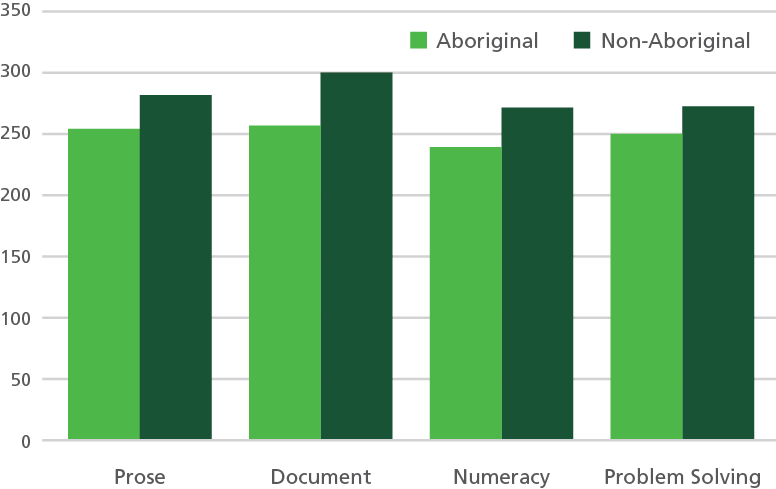

For the past decade, TD has worked with Frontier College, a national literacy organization, to create early literacy opportunities in Aboriginal communities. This is a story of collaboration, one that is better positioning Aboriginal youth for success.
The heart of the issue begins before they even enter school, with Aboriginal children scoring poorly on school-readiness testing compared to their peers.
“It is an unfortunate fact that more than 60% of Aboriginal Canadians do not have the literacy skills necessary to create a better life for themselves and their families, or to fully participate in the current knowledge-based economy.”
TD Economics, Literacy Matters: Unlocking the Literacy Potential of Aboriginal Peoples in Canada, June 2013
Literacy scores: 0 to theoretical max 500
Note: Calculated using population weights of Manitoba, Saskatchewan, Yukon, Northwest Territories and Nunavut.
Source: International Adult Literacy and Skills Survey, 2003.

This literacy gap is due to unique challenges that Aboriginal youth face, including:
See the positive impact the literacy camps are making in Elsipogtog First Nation, New Brunswick
“A positive future for Aboriginal youth is interlinked with their skills development, and literacy is a pivotal starting point.”
Clint Davis, Vice President, Aboriginal Banking, TD
Frontier College – a national, non-profit literacy organization – has developed a unique solution to level the playing field: literacy summer camps for Aboriginal youth. Offered since 2005, the free camps run for three to six weeks each summer and bring fun, high-quality programming to Aboriginal communities across Canada, including remote fly-in communities.
The main goals of the program are to prevent “summer learning loss” and to encourage a love of reading, ultimately leading to better educational outcomes in Aboriginal communities. Studies have shown that a love of reading, not just the ability to read, is more predictive of school success than any other factor.
“As recommended by the 2015 Truth and Reconciliation Commission of Canada: Calls to Action, the Aboriginal Summer Literacy Camps help to close the educational attainment gaps between Aboriginal and non-Aboriginal children.”
Frontier College, 2015 National Report on Aboriginal Summer Literacy Camps
Beyond reading, the camps engage students in arts and crafts, sports, games and field trips, but with an important twist – literacy and numeracy are embedded into the activities.
Additionally, the camps incorporate cultural activities and involve parents, Elders and other community members in leading activities and reading with the campers. By doing so, camp organizers integrate Aboriginal role models and approaches to learning.



“We’re proud to support this program which provides Aboriginal youth with the tools and resources they need to enhance their education and literacy skills.”
Clint Davis, Vice President, Aboriginal Banking, TD
To help foster this beneficial program, TD is a national sponsor reflecting our longtime commitment to Aboriginal communities and creating opportunities for young people. Our support has helped to support and grow the program nationwide – from an original five camps in Northern Ontario to over 120 camps across Canada last year.
In 2015, TD made a further $2.5 million donation to Frontier College to expand the program to reach more Indigenous children. This is the largest donation made to a single organization in TD’s history.
Giving a tech boost to the program, funding from TD has enabled One Laptop Per Child to make a real impact. The non-profit is contributing free, child-friendly tablets that are pre-loaded with educational software and digital books. Each tablet is equipped with up to three separate user accounts for children, allowing students to progress through interactive lessons at their own pace.
The tablets were introduced into the camps last summer, and will remain in the communities as a permanent donation to local schools, allowing year round learning.
“These tablets serve to enrich just about any lesson. I appreciate how there are apps designed for my class. The students get excited when they get to use the tablets during our Native Language class.”
Matthew Perlanski, Principal, Henry Coaster Memorial School
By the end of 2015, TD's investment in One Laptop Per Child reached over 2,500 students by providing tablets to 22 communities.
In 2016, an additional 1,000 students will receive tablets throughout 10 communities across the country.
 NU
NU
 BC
BC
 NB
NB
 ON
ON
 AB
AB
 SK
SK
 MB
MB
 QC
QC
“There is a noticeable and measurable difference in the literacy-based abilities of the students that attended the camp. The children came to school ready to learn and had skills I know were nurtured by the camp experience over the summer.”
Teacher in Cree Nation of Eastmain, QC
As a result of the relationship between Frontier College and TD, over 43,000 Aboriginal children and youth to date have taken part in the summer literacy camps and created lasting summer memories. With TD’s support in 2015 alone:
Over 120 camps were delivered in 99 communities across Canada; 25 communities hosted for the first time.
More than 6,640 children and youth participated, an increase of over 860 campers from the previous summer.
Some 300 camp staff benefited from training and meaningful employment – 44% of whom were First Nations, Metis and Inuit counsellors hired locally.
More than 37,000 free books were given to the communities.
Turning the corner on Aboriginal literacy will take time. Through long-term commitment, sustained investment and collaboration with community and education organizations, TD is working to be part of the solution.